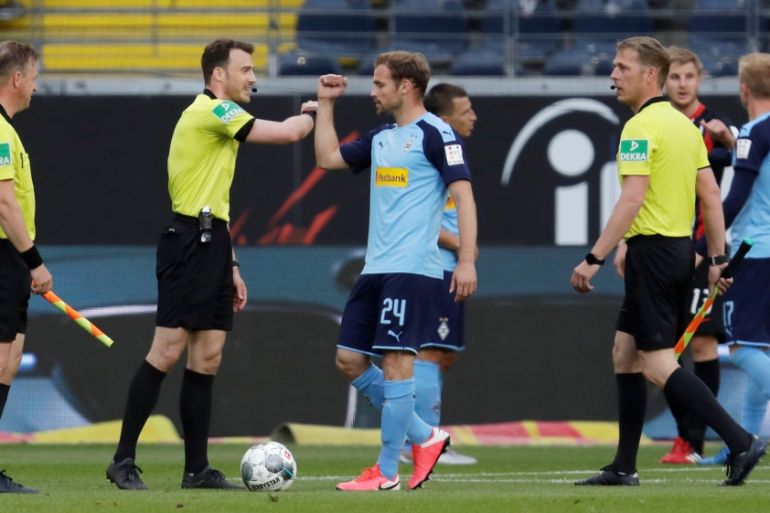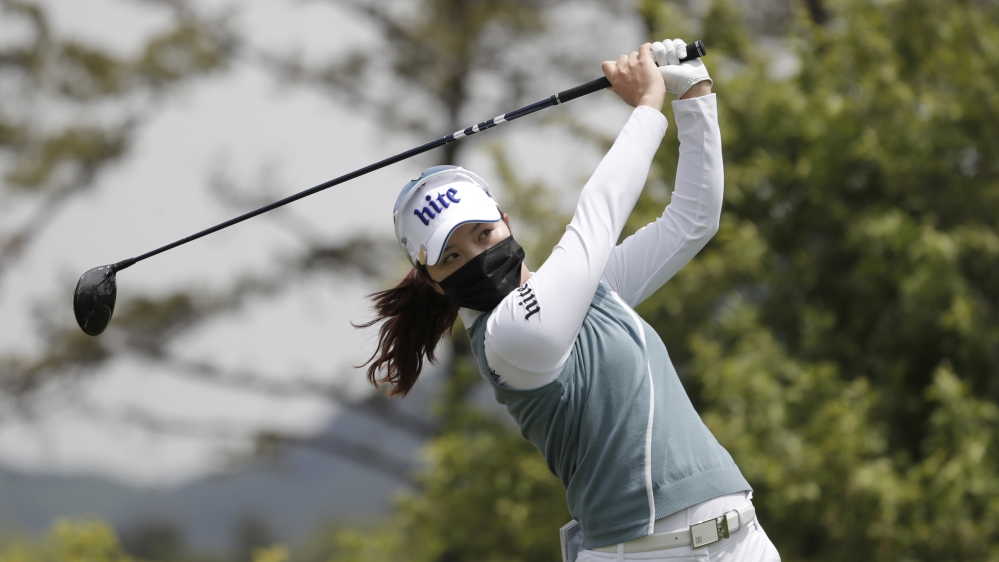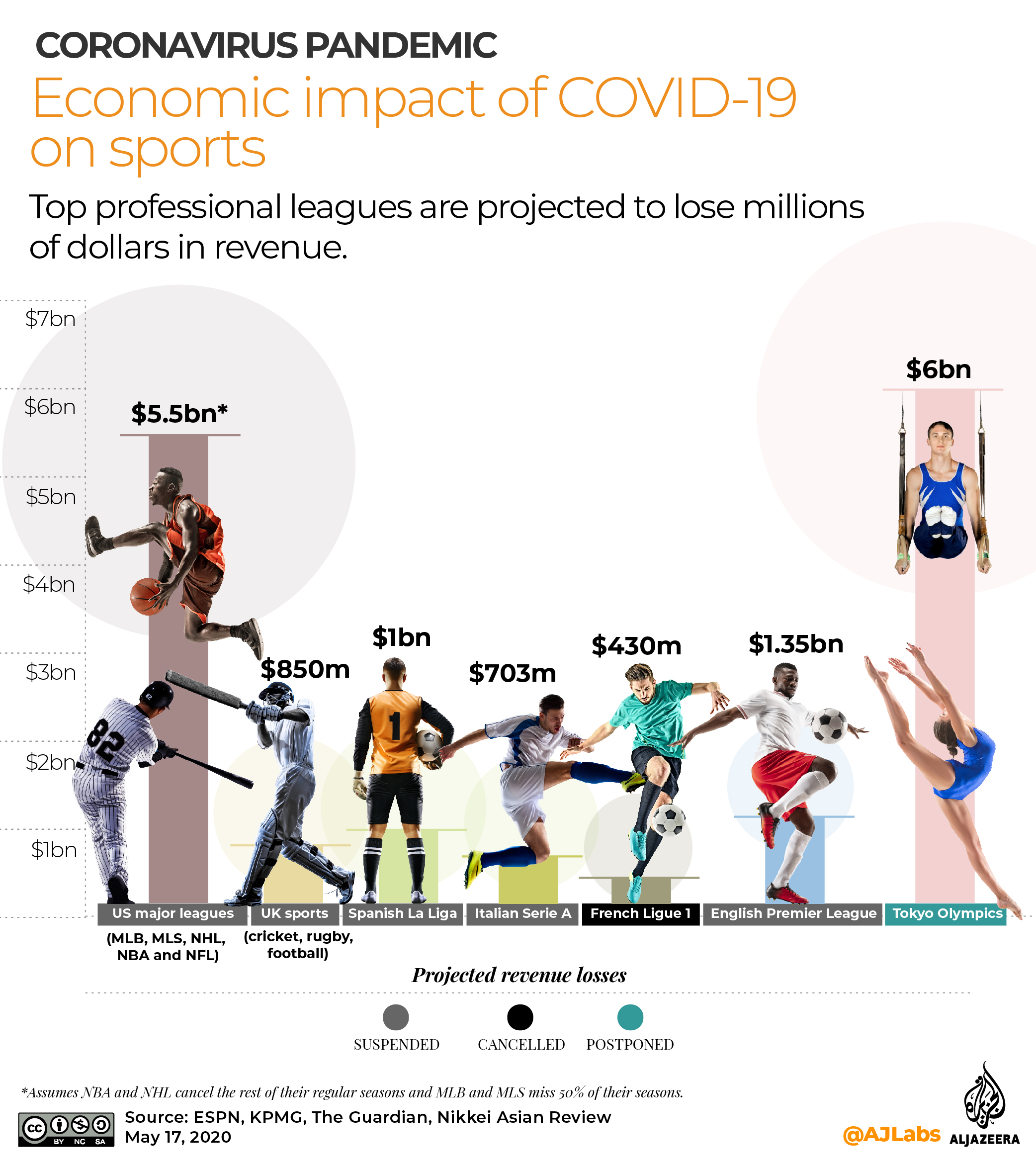‘Playful escape’: How sport is tackling coronavirus pandemic
As leagues resume play behind closed doors, teams are adjusting to new routines and restrictions amid health concerns.

Professional sport is cautiously returning to action amid the coronavirus pandemic as countries start to ease restrictions and lift lockdowns.
Germany’s Bundesliga football league, Korea Baseball Organization and the Ultimate Fighting Championship are among those that have restarted under strict safety measures.
Keep reading
list of 3 items‘Running is my therapy’: Marathons under lockdown
Global sports face ‘unprecedented’ test amid coronavirus outbreak
Golf’s PGA Tour and New Zealand’s Super Rugby will get under way next month. However, some sport, including the English Premier League football and basketball’s NBA are still negotiating how and when to return.
The threat of the highly contagious COVID-19 disease, caused by the new coronavirus, still looms large. More than 4.7 million people have been infected worldwide while there are at least 315,000 confirmed deaths, according to data collated by Johns Hopkins University.
This is why, despite the restarts, it is not business as usual on the field. As German football resumed over the weekend, there was no singing and chanting in the stands. Matches were played behind closed doors.
Three UFC events over the past eight days in Jacksonville, Florida were also held without fans.
Taiwan is allowing up to 2,000 spectators to attend baseball games. But in South Korea, printed cardboard banners, instead of people, occupy stands.
“Crowds and stadiums are a part of the sport product … if there are no people inside stadiums, the sport product changes fundamentally. It’s different straight away and so, this is not necessarily a return to normality,” Simon Chadwick, director of the Centre for the Eurasian Sport Industry, told Al Jazeera.

For players and officials, the resumption has also meant a drastic change in routines and rituals.
Players are regularly tested for the coronavirus, their temperatures are checked before each game and they are required to wear face masks off the pitch and maintain physical distance in buses and locker rooms.
On the field, group photos and children accompanying players are banned together with spitting and handshakes. Hugs and high-fives are strictly discouraged. Elbow bumps and foot taps are recommended.
In the United Kingdom, Premier League footballers will not be permitted to tackle and will only practise in groups of five when team training resumes, the BBC reported.
“Between the silent stress-navigating new rules and regulations surrounding day-to-day preparation and the oddity of fanless arenas, there will be an adjustment period for athletes,” sport psychologist Adam Naylor told Al Jazeera.
“Athletes will best cope with this new environment if they are patient with themselves and others,” said Naylor, adding that the absence of spectators may also affect the performance of top athletes.
“When the games begin, it is reasonable to expect some flat performances … a stadium full of fans has the power to dial in the focus and harness positive energy in professional athletes.”
Economic effect
The coronavirus pandemic has already wreaked havoc on the sporting calendar, forcing the postponement of major events including the 2020 Tokyo Olympics and football’s Euro Championship scheduled for this year.
Every sector of the sport industry has been hit hard, with the livelihoods of athletes, team staff and thousands of others working at sporting events affected.
With each game cancelled, revenue from broadcasting deals, sponsorship contracts and match tickets take a major hit.

The US sports leagues – NFL, NBA, NHL, MLS and MLB – are estimated to lose at least $3.2bn in gate revenue from mid-March till the end of June, an analysis by Sports Innovation Lab found.
British football, cricket and rugby could collectively lose about $850m in the coming year, according to figures revealed to UK members of Parliament.
In the most severely hit European countries, Spain’s football league, La Liga, could suffer a maximum revenue loss of $1bn and the Italian Serie A $703m if they are forced to cancel their seasons, according to a study by international accounting firm KPMG.
“The impact is not limited to the operating activities of football clubs, but will also affect their operations with players, which constitute the most valuable assets of any club,” KPMG said in its March report.
Players and clubs have been trying to keep in touch with fans through their social media accounts, posting quarantine updates and home workouts, as well as doing live Q&As.
‘Playful escape’
The pandemic has created an environment of fear and uncertainty among sport fans and the resumption of play has drawn a mixed response.
In a nationwide poll conducted by the Seton Hall University in the US, more than 70 percent of respondents said they will not attend games until a COVID-19 vaccine is developed.
In an open letter to UEFA and national associations, dozens of European football fan clubs strongly urged authorities to keep the ban on competitions “until crowding the stadiums is once again a habit free of risks for public health”.
Still, millions of sport-craved fans are tuning in from home to watch the live action online or on television, with broadcasters using creative ways, such as pre-recorded crowd noises in their telecasts, to compensate for the lack of atmosphere.
Naylor said he hoped “returning to play is at least a moment of playful escape for the athletes from our pandemic world just as watching them play will be a positive escape for fans that will tune in to watch.”
Follow Saba Aziz on Twitter: @saba_aziz